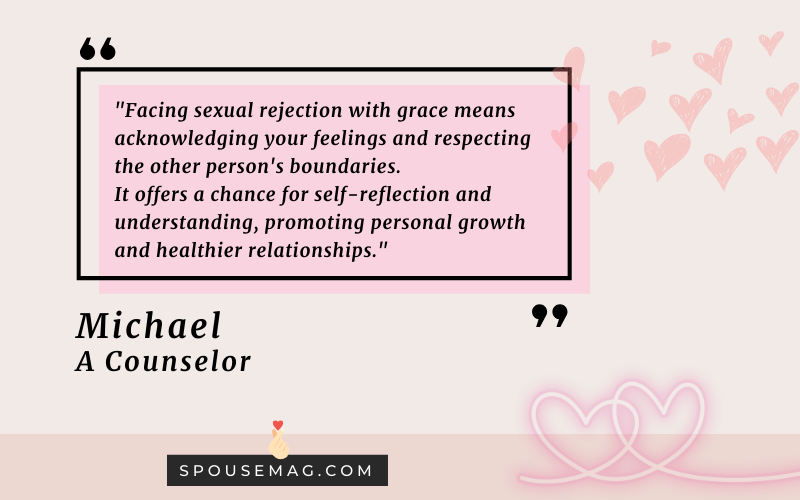
Your partner often feels guilt, pressure, or anxiety when they’re not in the mood for sex. They might have their own reasons, such as stress, fatigue, health issues, or emotional challenges. They also worry about you feeling upset or hurt by their refusal. However, this situation serves as an opportunity to enhance your communication, intimacy, and overall sexual satisfaction.
Sexual rejection from a partner is incredibly painful and confusing. It leads to feelings of insecurity, loneliness, and even self-doubt. You might start questioning your attractiveness or worry that something is fundamentally wrong with your relationship.
To navigate this challenging situation, start by opening up a conversation with your partner.
It’s important to remember that everyone experiences ups and downs in their sexual desire, and it doesn’t necessarily reflect your worth or the strength of your bond.
Key Takeaways:
- Remember, sexual rejection often stems from factors like stress or health issues, not always your attractiveness.
- Communicate openly and empathetically about your feelings and listen to your partner’s perspective.
- Focus on building emotional intimacy and consider seeking professional help if necessary to navigate challenges together.

Understanding Sexual Rejection:
One specific study on sexual desires conducted by Dr. Gurit E. Birnbaum explored how daily sexual interactions impact relationship satisfaction and emotional connection. Their research found that “when partners communicate openly about sexual needs and experiences, it can improve relationship quality and mitigate feelings of rejection”
Birnbaum’s work emphasizes the importance of addressing underlying emotional and psychological factors to foster better intimacy and understanding between partners.
Relationship dynamics, such as power struggles or unresolved conflicts, lead to diminished sexual interest. Personal preferences and boundaries further influence desire, sometimes causing mismatches between partners.
Now, there’s a difference between being rejected and feeling rejected:
| Feeling Rejected | Being Rejected | |
| Meaning | Thinking you’re rejected without a clear “no.” | Getting a direct “no” from your partner. |
| Emotional Impact | Brings up insecurity and doubt. | Hurts but gives clarity on boundaries. |
| Reasons | Misunderstandings, lack of communication, anxiety. | Partner’s stress, emotions, or personal issues. |
| Effects | More tension and confusion. | Chance for growth with empathy. |
| Resolution | Opens up dialogue and reassurance. | Needs respect and understanding of boundaries. |
Feeling rejected is about perceiving a lack of response as personal rejection and is often subjective, which triggers insecurity.
On the other hand, being rejected happens when a partner explicitly declines an advance. It can be painful, but it doesn’t necessarily mean you’re inadequate. It’s often about their current feelings or needs at that moment.
Quiz: Why Would a Guy Tell You About Another Girl?
5 Possible Reasons Why Your Partner Rejects You Sexually
Stress, fatigue, emotional disconnection, health issues, or even relationship dynamics lead to sexual disconnectedness. Understanding these factors helps navigate and improve intimacy in relationships.
1. Physical Health Factors
Markey, P. M., & Markey, C. N. (2015) research on sexual rejection has shown that health issues such as fatigue, hormonal changes, and chronic conditions like diabetes or thyroid disorders can profoundly affect an individual’s libido and sexual interest.
Showing understanding and patience during times of physical discomfort, and encouraging them to seek medical advice, can create a supportive environment where they feel cared for and understood.
2. Mental Health Challenges
Anxiety, depression, or stress greatly influence the husband/wife’s rejection of sexual intimacy. These conditions lead to fatigue, loss of interest, or heightened anxiety about physical closeness.
Men experiencing mental health challenges that can affect sexual intimacy often show symptoms such as anger, irritability, mood swings, changes in energy levels, sleep difficulties, persistent sadness, emotional numbness, and behaviors that disrupt family or social interactions.
It’s important to approach this with sensitivity, creating a safe space for your partner to express their feelings without judgment.
Supporting them in seeking professional help if needed and showing unconditional support can strengthen your bond and help face these challenges together.
3. Stress and Pressure
High levels of stress from various aspects of life—work, finances, family responsibilities— overwhelm your partner, making it difficult for them to relax and engage in physical intimacy.
Finding ways to alleviate stress together, such as through shared activities, relaxation techniques, or simply offering to take on some of their burdens, will help create a more relaxed and supportive environment for intimacy to flourish.
4. Relationship Dynamics
Unresolved conflicts, communication issues, resentment, and not finding each other attractive in the relationship create barriers to intimacy and can be and can be the signs of unhappy marriage.
Your partner’s response will stem from a need to address these underlying issues before feeling comfortable reconnecting physically.
Openly discussing concerns, actively listening to their perspective, and working together to strengthen emotional bonds rebuild trust and pave the way for a more fulfilling intimate connection.
5. Personal Boundaries and Preferences
Each person has unique boundaries and preferences when it comes to physical intimacy, influenced by personal comfort levels, past experiences, and cultural factors. Your partner’s response might reflect their need to respect these boundaries and feel secure in their physical interactions.
Respect and understand these preferences fosters a sense of trust and mutual respect in the relationship, ensuring that both partners feel valued and comfortable expressing their needs.
Approach these reasons with empathy and reassurance as this will create a supportive environment for understanding and navigating the lack of intimacy within your relationship.
Tips on What To Do If You Are Being Sexually Rejected By Your Partner:
- Reassure Yourself: Remember that sexual rejection isn’t a reflection of your worth. It can happen for many reasons unrelated to you.
- Create a Comfortable Space: Sometimes, simply changing the environment or routine can reignite intimacy.
- Focus on Intimacy Without Pressure: Engage in activities like cuddling or massage to build closeness without the expectation of sex. Look into effective couple therapy exercises.
- Set Aside Time for Each Other: Plan regular date nights or quiet evenings together to reconnect emotionally.
- Express Your Needs Gently: Share what you need from your partner in a loving and understanding way.
- Stay Curious: Ask your partner what they need or are feeling, showing genuine interest and empathy.
- Explore New Interests Together: Trying something new can bring excitement and closeness back into the relationship.
Here’s How to Communicate With Your Partner About This:
These tips will help you in communicating with your partner by creating a safe and comfortable zone for both of you:
- Find a relaxed time, like during a walk or quiet evening.
Example: “Hey, can we chat for a bit? I’ve been feeling a little distant lately, and I miss our connection.”
- Focus on your feelings to avoid sounding accusatory. (Share your feelings without blaming)
Example: “I’ve been feeling a bit unsure about where we stand, and I want to understand how you’re feeling too.”
- Encourage an open dialogue without pressure.
Example: “I’d love to hear what’s on your mind. Is there anything that’s been affecting how we connect?”
- Reinforce the strengths of your relationship.
Example: “I really appreciate how supportive you are. Let’s work together to bring back some of that spark.”
- Use easy, non-intimidating actions you both can try.
Example: “How about we set aside some time each week just for us, no distractions?”
Conclusion:
Listening to your partner’s perspective is equally important in this issue; they might be dealing with stress, health issues, or emotional barriers they haven’t shared yet.
Focus on non-sexual forms of intimacy as it will also help rebuild your connection. Spend quality time together, engage in shared activities, or simply enjoy each other’s company without the pressure of sex. Sometimes, a gentle touch, a warm hug, or a meaningful conversation can do wonders in bringing you closer. Additionally, self-care is crucial. Engage in activities that make you feel good about yourself, boost your confidence, and manage your stress levels.
Seeking professional help can be a valuable step if you both feel stuck. A therapist can provide a safe space to explore underlying issues and develop strategies to enhance your intimacy.
Remember, every relationship goes through phases, and facing this challenge with compassion and patience can lead to a deeper, more resilient bond.

As a married wife, founder, and editor of SpouseMag.com – these guides are based on my own personal experiences, observations, research and insights. I am transparent about being inspired by the life and work of the two greatest experts in the relationship space – Dr. John and Julia Gottman, and Harville and Helen. They two are some of the strongest couples, researchers, authors, and counselors when it comes to marriage and relationships. My advice and guides are based on my insights and research, and they are not an alternative to professional advice.






